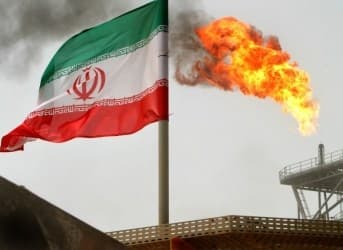The title of the 30 January report by the Special Inspector General for Afghanistan Reconstruction (SIGAR) Office of Special Projects says it all.
“AFGHAN NATIONAL SECURITY FORCES: LIMITED VISIBILITY OVER FUEL IMPORTS INCREASES THE RISK THAT U.S.-FUNDED FUEL PURCHASES COULD VIOLATE U.S. ECONOMIC SANCTIONS AGAINST IRAN.”(http://www.sigar.mil/pdf/alerts/2013-01-30-alert-sp-13-2.pdf).
Who is SIGAR?
According to its website, “SIGAR employees travel throughout Afghanistan to complete their mission. As of March 2012, Congress has provided over $89.5 billion in humanitarian and reconstruction assistance to Afghanistan. These funds are used to build the Afghan National Security Forces, promote good governance, conduct development assistance, and engage in counter-narcotics and anti-corruption efforts. Congress created the Office of the Special Inspector General for Afghanistan Reconstruction (SIGAR) to provide independent and objective oversight of Afghanistan reconstruction projects and activities. Under the authority of Section 1229 of the National Defense Authorization Act for Fiscal Year 2008 (P.L. 110-181), SIGAR conducts audits and investigations to: 1) promote efficiency and effectiveness of reconstruction programs and 2) detect and prevent waste, fraud, and abuse.”
And what exactly have those doughty SIGAR employees discovered in their peregrinations throughout Afghanistan?
“The fact that the United States has paid for the acquisition and delivery of imported fuel for the Afghan National Security Forces (ANSF)—nearly $1.1 billion for the Afghan National Army (ANA) alone between fiscal years 2007 and 2012—raises concerns that U.S. funds could have been used to pay for imports of fuel potentially in violation of US economic sanctions against Iran.”
“SIGAR initiated this review in response to allegations it received of potential violations of U.S. sanctions in the purchase of fuel for the ANSF and to follow up on key issues regarding Afghanistan’s fuel imports identified in our quarterly reports and audits and investigations of ANA fuel. In this review, we sought to identify whether sufficient controls have been established in the ANSF fuel supply process to ensure the use of U.S. funding complies with U.S. and international sanctions against Iran. This review did not assess any procedures in place for assuring the quality of fuel imports purchased for the ANSF.”
Fulfilling its mandate, SIFGAR reported, “To conduct this review, we relied largely on data, documents, and interviews collected from the Department of Defense (DOD) during our ongoing audit of ANA fuel, Department of State and Department of the Treasury responses to SIGAR’s quarterly data call, and information collected in support of ongoing fuel investigations. We also reviewed reports and available data on Afghanistan fuel consumption and imports, U.S. government sanctions against Iran, relevant United Nations Security Council resolutions, fuel blanket purchase agreements (BPAs) for the ANSF, Afghan government budget documents, and prior reports on ANSF logistic capabilities and oversight. We conducted this review in Washington, D.C., from December 2012 to January 2013. This work was conducted under the authority of Public Law No. 110-181, as amended; the Inspector General Act of 1978; and the Inspector General Reform Act of 2008.”
This is not an insignificant finding, as International Security and NATO forces, led, by the U.S. along with U.S. contractors, are burning through approximately a million gallons of fuel per day, every single drop of which is imported, as Afghanistan has no indigenous production resources. Should DC anti-Russian hawks care to review the situation, the bulk of the fuel for ISAF is currently provided by Russian refineries.
Furthermore, the “in country” costs can be substantial. At some isolated “forward operating bases,” the cost of fuel can reach $400 a gallon, being supplied by parachute drop, some of which have not had overland fuel transports for nearly three years, shades of Dien Bien Phu, for those with historical memories..
In November 2012, SIGAR met with a senior Combined Security Transition Command – Afghanistan (CSTC-A) official in Afghanistan and discussed whether U.S. funding was being used to purchase Iranian fuel for ANSF. “In that meeting, the senior CSTC-A official stated that quality control testing measures were in place to test fuel but that it still may be a possibility that fuel purchases could include Iranian fuel, given the multiple sources involved in the fuel acquisition process for operations in Afghanistan. He stated that it is important to examine this topic, including the controls that are in place to prevent any violations of U.S. sanctions with Iran.”
The money quote from the SIGAR report?
“DOD’s lack of visibility—until recently—over the source of fuel purchased for the ANSF raises some concerns. DOD lacked certification procedures prior to November 2012 and had limited visibility over the import and delivery sub-contracts used by fuel vendors. As a result, DOD is unable to determine if any of the $1.1 billion in fuel purchased for the ANA between fiscal year 2007 and 2012 came from Iran, in violation of U.S. economic sanctions.”
When is a sanction not a sanction?
In a war zone?
When busted by an “ally?”
Pentagon top brass summoned to Capitol Hill to explain?
Congressional hearings, anyone?
By. John C.K. Daly of Oilprice.com


















